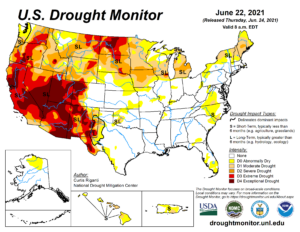The ongoing heat wave in the western states is shattering hundreds of high temperature records.
The extreme heat has now moved into the Pacific Northwest and threatens some all-time records in Seattle and Portland. Seattle has only ever recorded three days over 100 degrees in the last 76 years, but stood a decent chance of seeing three in a row over the weekend.
This extended heat wave is partly a function of the climatology of the western states, partly a function of larger-scale circulation anomalies particular to this June, and partly a function of the gradually warming climate.
It is quite normal for the elevated, often arid, terrain of western North America to support the development of tropospheric-deep anticyclones, or regions of high pressure. This is because the height of the tropopause, the “lid” atop the lowest layer of the atmosphere, the troposphere, is directly tied to the average temperature of the underlying air column. In summer, it is easy to warm the air columns above mountains and produce a locally elevated tropopause. The resulting anticyclone encourages gentle sinking of air which keeps the skies clear and limits precipitation production.
As the underlying ground continues to dry out in the absence of rain, it warms more each day and temperatures start to climb. The same circumstances intensify drought conditions so heat waves and droughts go hand-in-hand as a matter of course.
Global warming has increased the background temperature fractionally and leads to reduction in snowpack, reduction in summer precipitation, and increased aridity in the mountainous regions of western North America.
So, the current heat wave and severe drought are physically interrelated and are supported by the background warming. All of this puts the region at extreme risk, again, for a prolonged and devastating wildfire season.
Steve Ackerman and Jonathan Martin, professors in the UW-Madison department of atmospheric and oceanic sciences, are guests on WHA radio (970 AM) at 11:45 a.m. the last Monday of each month. Send them your questions at stevea@ssec.wisc.edu or jemarti1@wisc.edu.


